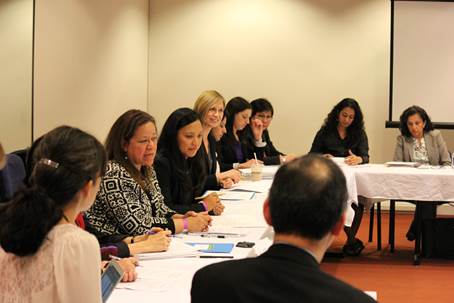
On May 14, senior staff from the U.S. Department of Health and Human Services (HHS) hosted a Community Engagement Roundtable with 19 Asian American, Native Hawaiian, and Pacific Islander (AAPI) community health leaders, including three members of the President’s Commission on AAPIs to learn about barriers to health that AAPIs face. Officials from HHS included: Kevin Thurm, Senior Counselor to HHS Secretary Burwell; Jim Macrae, Acting Administrator of the Health Resources and Services Administration (HRSA); and representatives from the Office for Civil Rights, Office of Minority Health (OMH), the Centers for Medicare and Medicaid Services (CMS), and the Substance Abuse and Mental Health Services Administration (SAMHSA).
The AAPI community health leaders presented HHS with specific policy recommendations in five priority areas:
- Ensuring a strong safety net system
- Increasing enrollment under the Affordable Care Act
- Ensuring adequate coverage for mental health and substance abuse disorders
- Meeting the needs of Native Hawaiians
- Meeting the needs of AAPI women
Community members also shared stories that showed how specific AAPI communities are impacted by programs and policies that do not take AAPI needs into account. For example, community health centers that serve a large proportion of limited English proficient (LEP) patients are at a competitive disadvantage in recruiting health professionals because the LEP population is not technically considered medically underserved, preventing these centers from receiving federal funding. Additionally, one member of the Nepalese refugee community shared the community’s need for additional resources and support, as members struggle with new mental and emotional trauma in the aftermath of the earthquake that hit the country in April.
After listening to the community members’ stories, the federal officials present shared some improvements that their agencies are making in response to the AAPI community’s concerns. The Office of Intergovernmental and External Affairs volunteered to act as a direct point of contact for concerns around language access in implementation of the Affordable Care Act, while CMS shared a number of improvements on how immigrants and LEP) consumers receive information on the Affordable Care Act. HRSA also discussed its efforts to improve access to behavioral and mental health services in Federally Qualified Health Centers (FQHCs) and to survey patients in culturally and linguistically appropriate ways. Finally, SAMHSA responded immediately to the concerns raised by the Nepalese community, committing to the translation of materials on disaster mental health care services into Nepalese and ensuring that its Disaster Distress Hotline (1-800-985-5990) has in-language operators for community members seeking help.
It is important for federal officials to hear the stories and concerns from AAPI families and communities, so that federal policies are informed by real life consequences. Having federal officials who are willing to listen and work with AAPI community leaders to find solutions provides greater opportunities for partnership and progress. HHS plans to hold a follow-up meeting with AAPI community leaders later this summer to continue working with community leaders to improve the health of AAPI families and communities.
Gem Daus is Policy Advisor at the White House Initiative on Asian Americans and Pacific Islanders.


